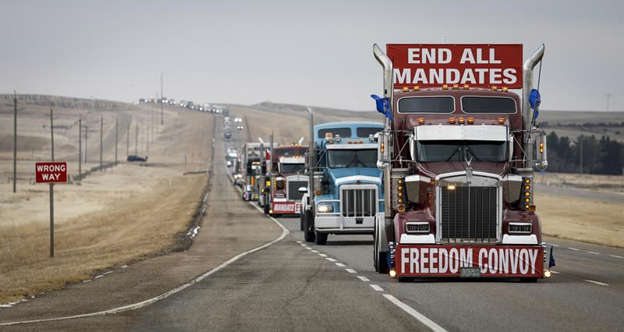Alberta
‘It could have been deadly’: Truckers end blockade at Alberta border crossing

COUTTS, Alta. — A blockade that paralyzed a United States border crossing for more than two weeks ended Tuesday as trucks and other vehicles with horns blaring rolled away from a southern Alberta community.
Protesters had been restricting access to the busy crossing near Coutts since Jan. 29 to rally against COVID-19 vaccine mandates for truckers and broader pandemic health restrictions.
Canada Border Services Agency said operations had resumed at the crossing and RCMP confirmed later Tuesday that traffic was moving smoothly.
The exodus of vehicles came one day after RCMP arrested 13 people and seized a cache of firearms and ammunition.
Charges laid include possession of weapons and mischief to property.
Four people also face a charge of conspiracy to murder RCMP members, said Chief Supt. Trevor Daroux. He said police worked closely with the Crown to ensure they had the necessary evidence to lay those charges.
Some of the accused were granted release in a Lethbridge, Alta., courtroom on Tuesday. A judge also ordered that they can’t contact one another or be within a 200-metre radius of any protest.
Mounties said an early-morning raid Monday uncovered 13 long guns, handguns, a machete, a large quantity of ammunition and body armour. Two additional weapons were seized later in the day.
RCMP also said a semi-truck and farm tractor had attempted to ram a police cruiser on Sunday.
“The dangerous criminal activity occurring away from the TV cameras and social media posts was real and organized,” said Deputy Commissioner Curtis Zablocki on Tuesday evening.
“It could have been deadly for citizens, protesters and officers.”
Daroux said the RCMP became aware of the heavily armed group a few days after the protest began. He said investigations are ongoing into this group and other events that took place during the blockade.
“Alberta RCMP will remain in the area until we are confident that the situation is safe and stabilized for all who travel through here,” he said.
Protesters are dissociating themselves from the group of people facing serious charges. Organizer Marco Van Huigenbos said that is why the convoy decided to leave peacefully.
He said he has no regrets about participating in the blockade.
“I think we’ve started a movement where people are going to get more involved … at the municipal level, provincial possibly, but also more involvement in politics in general.”
Two tactical vests seized by the RCMP had badges on them, which the Canadian Anti-Hate Network said have links to troubling movements.
One vest had a “Diagolon” patch on it, a white diagonal line across a black rectangle, that is linked to an often conspiratorial and antisemitic group, said Peter Smith from the network. He said the group often talks about a soon-approaching civil war.
“(Their) rhetoric is very violent,” said Smith. “One of the, kind of, common phrases used within the community is ‘A gun or rope?'”
The other patch said “Infidel” in both English and Arabic in yellow. Smith said the patch doesn’t indicate membership to a specific network but is known among Islamophobic militias and biker-style hate groups.
He said the biggest worry is having niche extremist networks that could work to inflame supporters linked to what was supposed to be a peaceful protest.
There was celebrating when the protest started winding down late Monday. A video posted to social media showed RCMP members shaking hands with and hugging protesters. People holding hats or hands to their chests or with arms draped across each other’s shoulders sang O Canada.
Cpl. Gina Slaney confirmed the scene was from Monday night in Coutts.Zablocki said RCMP is aware of the video.
“I will say, we do encourage our members to engage with the public and develop respectful, professional relationships with all Albertans,” said Zablocki. “We will be looking further into this matter.”
Jim Willett, mayor of the village of 250 people, said it had been a while since he had seen anything but semi-trailers on Highway 4.
“I can see all the way to Regina,” he said with a laugh.
Willett said he doesn’t blame the blockade leaders for the cache of weapons.
“They were a well-behaved bunch of people,” he said. “I think the organizers were taken aback as much as we were by what the RCMP discovered.”
The number of protesters at a police checkpoint, north of Coutts, had also dwindled and work was underway to start clearing away a first-aid trailer, a sauna and electric generators.
“Last night, emotions were high … I think a lot of people felt that we were giving up, but we’re not giving up,” said John Vanreeuwyk, a feedlot operator from Coaldale, Alta., also a protest organizer.
“Is it a victory? No. A victory means we’re done,” he said.
The blockade was one of several demonstrations in Canadian cities and border points that stalled trade, stranded travellers and disrupted lives of area residents, particularly in Ottawa.
Deputy Prime Minister Chrystia Freeland has said $48 million in trade was lost each day that the Coutts border was closed.
— With files from Alanna Smith in Calgary
This report by The Canadian Press was first published Feb. 15, 2022.
Bill Graveland, The Canadian Press
Alberta
Alberta can’t fix its deficits with oil money: Lennie Kaplan

This article supplied by Troy Media.
Alberta is banking on oil to erase rising deficits, but the province’s budget can’t hold without major fiscal changes
Alberta is heading for a fiscal cliff, and no amount of oil revenue will save it this time.
The province is facing ballooning deficits, rising debt and an addiction to resource revenues that rise and fall with global markets. As Budget 2026 consultations begin, the government is gambling on oil prices to balance the books again. That gamble is failing. Alberta is already staring down multibillion-dollar shortfalls.
I estimate the province will run deficits of $7.7 billion in 2025-26, $8.8 billion in 2026-27 and $7.5 billion in 2027-28. If nothing changes, debt will climb from $85.2 billion to $112.3 billion in just three years. That is an increase of more than $27 billion, and it is entirely avoidable.
These numbers come from my latest fiscal analysis, completed at the end of October. I used conservative assumptions: oil prices at US$62 to US$67 per barrel over the next three years. Expenses are expected to keep growing faster than inflation and population. I also requested Alberta’s five-year internal fiscal projections through access to information but Treasury Board and Finance refused to release them. Those forecasts exist, but Albertans have not been allowed to see them.
Alberta has been running structural deficits for years, even during boom times. That is because it spends more than it brings in, counting on oil royalties to fill the gap. No other province leans this hard on non-renewable resource revenue. It is volatile. It is risky. And it is getting worse.
That is what makes Premier Danielle Smith’s recent Financial Post column so striking. She effectively admitted that any path to a balanced budget depends on doubling Alberta’s oil production by 2035. That is not a plan. It is a fantasy. It relies on global markets, pipeline expansions and long-term forecasts that rarely hold. It puts taxpayers on the hook for a commodity cycle the province does not control.
I have long supported Alberta’s oil and gas industry. But I will call out any government that leans on inflated projections to justify bad fiscal choices.
Just three years ago, Alberta needed oil at US$70 to balance the budget. Now it needs US$74 in 2025-26, US$76.35 in 2026-27 and US$77.50 in 2027-28. That bar keeps rising. A single US$1 drop in the oil price will soon cost Alberta $750 million a year. By the end of the decade, that figure could reach $1 billion. That is not a cushion. It is a cliff edge.
Even if the government had pulled in $13 billion per year in oil revenue over the last four years, it still would have run deficits. The real problem is spending. Since 2021, operating spending, excluding COVID-19 relief, has jumped by $15.5 billion, or 31 per cent. That is nearly eight per cent per year. For comparison, during the last four years under premiers Ed Stelmach and Alison Redford, spending went up 6.9 per cent annually.
This is not a revenue problem. It is a spending problem, papered over with oil booms. Pretending Alberta can keep expanding health care, education and social services on the back of unpredictable oil money is reckless. Do we really want our schools and hospitals held hostage to oil prices and OPEC?
The solution was laid out decades ago. Oil royalties should be saved off the top, not dumped into general revenue. That is what Premier Peter Lougheed understood when he created the Alberta Heritage Savings Trust Fund in 1976. It is what Premier Ralph Klein did when he cut spending and paid down debt in the 1990s. Alberta used to treat oil as a bonus. Now it treats it as a crutch.
With debt climbing and deficits baked in, Alberta is out of time. I have previously laid out detailed solutions. But here is where the government should start.
First, transparency. Albertans deserve a full three-year fiscal update by the end of November. That includes real numbers on revenue, expenses, debt and deficits. The government must also reinstate the legal requirement for a mid-year economic and fiscal report. No more hiding the ball.
Second, a real plan. Not projections based on hope, but a balanced three-year budget that can survive oil prices dropping below forecast. That plan should be part of Budget 2026 consultations.
Third, long-term discipline. Alberta needs a fiscal sustainability framework, backed by a public long-term report released before year-end.
Because if this government will not take responsibility, the next oil shock will.
Lennie Kaplan is a former senior manager in the fiscal and economic policy division of Alberta’s Ministry of Treasury Board and Finance, where, among other duties, he examined best practices in fiscal frameworks, program reviews and savings strategies for non-renewable resource revenues. In 2012, he won a Corporate Values Award in TB&F for his work on Alberta’s fiscal framework review. In 2019, Mr. Kaplan served as executive director to the MacKinnon Panel on Alberta’s finances—a government-appointed panel tasked with reviewing Alberta’s spending and recommending reforms.
Alberta
IEA peak-oil reversal gives Alberta long-term leverage

This article supplied by Troy Media.
The peak-oil narrative has collapsed, and the IEA’s U-turn marks a major strategic win for Alberta
After years of confidently predicting that global oil demand was on the verge of collapsing, the International Energy Agency (IEA) has now reversed course—a stunning retreat that shatters the peak-oil narrative and rewrites the outlook for oil-producing regions such as Alberta.
For years, analysts warned that an oil glut was coming. Suddenly, the tide has turned. The Paris-based IEA, the world’s most influential energy forecasting body, is stepping back from its long-held view that peak oil demand is just around the corner.
The IEA reversal is a strategic boost for Alberta and a political complication for Ottawa, which now has to reconcile its climate commitments with a global outlook that no longer supports a rapid decline in fossil fuel use or the doomsday narrative Ottawa has relied on to advance its climate agenda.
Alberta’s economy remains tied to long-term global demand for reliable, conventional energy. The province produces roughly 80 per cent of Canada’s oil and depends on resource revenues to fund a significant share of its provincial budget. The sector also plays a central role in the national economy, supporting hundreds of thousands of jobs and contributing close to 10 per cent of Canada’s GDP when related industries are included.
That reality stands in sharp contrast to Ottawa. Prime Minister Mark Carney has long championed net-zero timelines, ESG frameworks and tighter climate policy, and has repeatedly signalled that expanding long-term oil production is not part of his economic vision. The new IEA outlook bolsters Alberta’s position far more than it aligns with his government’s preferred direction.
Globally, the shift is even clearer. The IEA’s latest World Energy Outlook, released on Nov. 12, makes the reversal unmistakable. Under existing policies and regulations, global demand for oil and natural gas will continue to rise well past this decade and could keep climbing until 2050. Demand reaches 105 million barrels per day in 2035 and 113 million barrels per day in 2050, up from 100 million barrels per day last year, a direct contradiction of years of claims that the world was on the cusp of phasing out fossil fuels.
A key factor is the slowing pace of electric vehicle adoption, driven by weakening policy support outside China and Europe. The IEA now expects the share of electric vehicles in global car sales to plateau after 2035. In many countries, subsidies are being reduced, purchase incentives are ending and charging-infrastructure goals are slipping. Without coercive policy intervention, electric vehicle adoption will not accelerate fast enough to meaningfully cut oil demand.
The IEA’s own outlook now shows it wasn’t merely off in its forecasts; it repeatedly projected that oil demand was in rapid decline, despite evidence to the contrary. Just last year, IEA executive director Fatih Birol told the Financial Times that we were witnessing “the beginning of the end of the fossil fuel era.” The new outlook directly contradicts that claim.
The political landscape also matters. U.S. President Donald Trump’s return to the White House shifted global expectations. The United States withdrew from the Paris Agreement, reversed Biden-era climate measures and embraced an expansion of domestic oil and gas production. As the world’s largest economy and the IEA’s largest contributor, the U.S. carries significant weight, and other countries, including Canada and the United Kingdom, have taken steps to shore up energy security by keeping existing fossil-fuel capacity online while navigating their longer-term transition plans.
The IEA also warns that the world is likely to miss its goal of limiting temperature increases to 1.5 °C over pre-industrial levels. During the Biden years, the IAE maintained that reaching net-zero by mid-century required ending investment in new oil, gas and coal projects. That stance has now faded. Its updated position concedes that demand will not fall quickly enough to meet those targets.
Investment banks are also adjusting. A Bloomberg report citing Goldman Sachs analysts projects global oil demand could rise to 113 million barrels per day by 2040, compared with 103.5 million barrels per day in 2024, Irina Slav wrote for Oilprice.com. Goldman cites slow progress on net-zero policies, infrastructure challenges for wind and solar and weaker electric vehicle adoption.
“We do not assume major breakthroughs in low-carbon technology,” Sachs’ analysts wrote. “Even for peaking road oil demand, we expect a long plateau after 2030.” That implies a stable, not shrinking, market for oil.
OPEC, long insisting that peak demand is nowhere in sight, feels vindicated. “We hope … we have passed the peak in the misguided notion of ‘peak oil’,” the organization said last Wednesday after the outlook’s release.
Oil is set to remain at the centre of global energy demand for years to come, and for Alberta, Canada’s energy capital, the IEA’s course correction offers renewed certainty in a world that had been prematurely writing off its future.
Toronto-based Rashid Husain Syed is a highly regarded analyst specializing in energy and politics, particularly in the Middle East. In addition to his contributions to local and international newspapers, Rashid frequently lends his expertise as a speaker at global conferences. Organizations such as the Department of Energy in Washington and the International Energy Agency in Paris have sought his insights on global energy matters.
Troy Media empowers Canadian community news outlets by providing independent, insightful analysis and commentary. Our mission is to support local media in helping Canadians stay informed and engaged by delivering reliable content that strengthens community connections and deepens understanding across the country.
-

 Alberta16 hours ago
Alberta16 hours agoFrom Underdog to Top Broodmare
-

 Alberta2 days ago
Alberta2 days agoAlberta and Ottawa ink landmark energy agreement
-

 International2 days ago
International2 days agoAfghan Ex–CIA Partner Accused in D.C. National Guard Ambush
-

 Carbon Tax2 days ago
Carbon Tax2 days agoCanadian energy policies undermine a century of North American integration
-

 International2 days ago
International2 days agoIdentities of wounded Guardsmen, each newly sworn in
-

 Alberta2 days ago
Alberta2 days agoWest Coast Pipeline MOU: A good first step, but project dead on arrival without Eby’s assent
-

 COVID-191 day ago
COVID-191 day agoCanadian government seeking to destroy Freedom Convoy leader, taking Big Red from Chris Barber
-

 Energy2 days ago
Energy2 days agoPoilievre says West Coast Pipeline MOU is no guarantee






